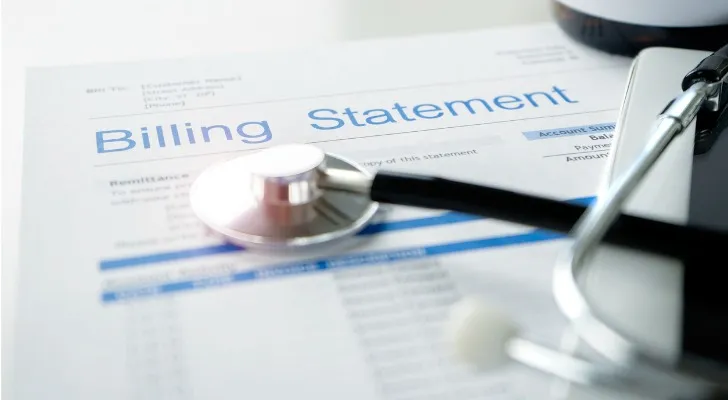Dealing with medical debt can be daunting, especially when it comes to understanding your responsibility for your spouse’s medical expenses. Whether you’re married or considering marriage, it’s important to know how medical debt is handled under state laws and joint financial agreements. Are you responsible for your spouse’s medical debt? The answer depends on several factors, including the laws of your state, the nature of the debt and whether you live in a community property state. Knowing your obligations can help you manage finances effectively and avoid unexpected liabilities.
A financial advisor can help you build a holistic financial plan that accounts for your debt and liabilities. Find a fiduciary advisor today.
Community Property States vs. Common Law States
Different states use different sets of laws when settling who owns what in a marriage. Whether you are responsible for your spouse’s medical debt largely depends on whether your state is a community property or common law state.
Community Property States
In community property states, both spouses are considered equally responsible for debts incurred during the marriage. This means that if your spouse incurs medical debt, you are typically responsible for it as well. There are nine states in the U.S. that follow community property laws:
- Arizona
- California
- Idaho
- Louisiana
- Nevada
- New Mexico
- Texas
- Washington
- Wisconsin
These laws are based on the principle that any property or debt acquired during the marriage is jointly owned. Even if the medical debt is solely in your spouse’s name, creditors can seek repayment from you.
Common Law States
States where community property laws don’t apply are known as common law or equitable distribution states. These states generally hold individuals responsible for their own debts. Alaska, South Dakota and Tennessee allow couples to opt into a community property agreement.
If you live in a common law state, you are typically not responsible for your spouse’s medical debt unless you co-signed on the debt. Common law states operate on the notion that property and debt acquired by one spouse is owned separately, unless jointly acquired. Therefore, if your spouse incurs medical debt, you are not automatically responsible for it.
Doctrine of Necessaries

However, there are exceptions, particularly when it comes to medical debt. Some states have “Doctrine of Necessities” laws, which hold spouses responsible for each other’s necessary expenses, including medical costs.
The Doctrine of Necessaries is a legal principle that can make one spouse responsible for the other’s essential expenses, including medical debt. Rooted in common law, this doctrine obligates a spouse to provide for the basic needs of the other, such as food, shelter, clothing and medical care. If one spouse incurs medical expenses, the other may be legally required to pay, even if they were not directly involved in the decision or agreement for the medical services.
This doctrine’s application varies by state, with some states adhering strictly to it and others modifying or limiting its scope. For instance, some states may only enforce the doctrine if the couple is living together, while others might consider the income and financial situation of both spouses. Courts often assess whether the medical expenses were necessary and if the spouse in question had the means to cover them.
Understanding the Doctrine of Necessaries is vital for spouses, particularly in cases involving significant medical bills. It emphasizes the importance of shared financial responsibility in a marriage, potentially affecting financial planning and decision-making. Spouses should be aware of their state’s specific laws regarding this doctrine to better navigate potential financial obligations.
What Is a Financial Responsibility Agreement?
A financial responsibility agreement is a legal document where one party agrees to be responsible for certain debts or obligations of another. This agreement can significantly affect whether one spouse is responsible for the other’s medical debt.
When signing a financial responsibility agreement at a medical facility, an individual might agree to cover any costs incurred by their spouse. This can happen during the admission process at a hospital or when signing up for medical services. The terms outlined in this agreement can determine the extent of financial liability.
In many states, the Doctrine of Necessaries holds that spouses are responsible for each other’s essential expenses, which include medical bills. However, the specific terms of the financial responsibility agreement can either reinforce or limit this obligation. It’s important to read and understand any document before signing to avoid unexpected liabilities.
Without a financial responsibility agreement, whether one spouse is liable for the other’s medical debt can depend on state laws and the specific circumstances of the debt.
Joint Accounts and Medical Debt

When medical bills are paid using a joint credit card or a joint bank account, both spouses may be responsible for the debt. A joint account signifies shared financial responsibility. Therefore, any debt incurred through this account, including medical expenses, becomes a liability for both account holders.
In community property states, debts incurred by either spouse during the marriage are generally considered joint debts. This means that medical bills paid with joint accounts can legally bind both spouses to the obligation. However, in common law states, the responsibility for medical debt may depend more on who signed the contract for medical services. Even in these states, using a joint account can still implicate both parties in the debt due to the shared nature of the account.
How to Deal With Medical Debt Collectors
When faced with collectors seeking payment for a spouse’s medical bills, it’s important to know your rights and respond carefully. Here are some tips for dealing with medical debt collectors:
- Understand your legal responsibility: Determine if you are legally responsible for the debt. In many states, spouses are held accountable for each other’s medical debts due to “doctrine of necessaries” laws. However, this varies by location and individual circumstances.
- Request verification: When contacted by a debt collector, always request a written verification of the debt. This document should include the amount owed, the name of the creditor, and details proving that the debt is yours to pay. Without this verification, you should not make any payments.
- You have rights: The Fair Debt Collection Practices Act (FDCPA) offers protection against harassment and deceptive actions. Debt collectors are prohibited from calling at unreasonable hours, using abusive language, or making false threats. Should they breach these regulations, you have the option to report them to the Consumer Financial Protection Bureau (CFPB).
- Negotiate payment plans: If the debt is verified and you’re responsible, try negotiating a payment plan with the collector. Many collectors are willing to set up manageable monthly payments or even settle for a reduced lump sum.
- Seek professional help: Consulting a financial advisor or attorney can provide personalized guidance based on your situation. They can help you navigate the complexities of medical debt and protect your financial well-being.
Bottom Line
The extent of your liability for your spouse’s medical debt depends on various factors, including state laws surrounding essential care, whether you live in a community property or common law state, and specific agreements such as financial responsibility documents. By being informed about these nuances, you can better navigate potential financial obligations, avoid unexpected liabilities and make more strategic decisions about managing and mitigating medical debt within your marriage.
Tips for Getting Out of Debt
- When facing debt, having a strategy plan for paying it off can make all the difference. The debt snowball method suggests tackling your smallest debts first while making the minimum payments on your other debts, allowing you to gain momentum and stay motivated by observing quick progress. Conversely, the debt avalanche method calls for paying off the debts with the highest interest rates first, potentially saving you more on interest payments over time. While both approaches can be effective, choose the one that aligns best with your financial circumstances and personal preferences.
- A financial advisor can potentially help you manage and pay off debt as part of a holistic financial plan. Finding a financial advisor doesn’t have to be hard. SmartAsset’s free tool matches you with up to three vetted financial advisors who serve your area, and you can have a free introductory call with your advisor matches to decide which one you feel is right for you. If you’re ready to find an advisor who can help you achieve your financial goals, get started now.
Photo credit: ©iStock.com/andreswd, ©iStock.com/jittawit.21, ©iStock.com/ljubaphoto
